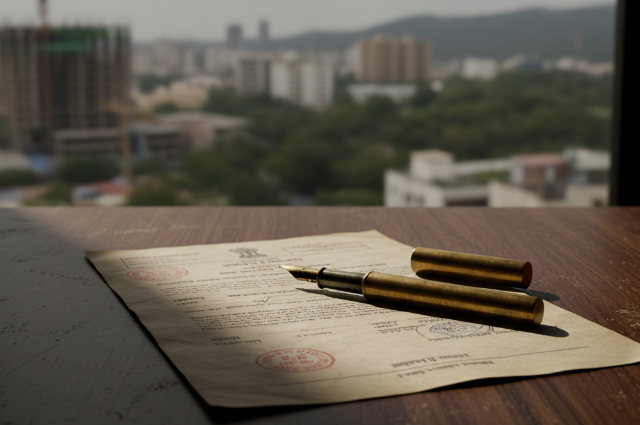
How it started
It was supposed to be just another story on the news, a ₹300-crore land deal somewhere in Pune, something about papers and registration and a politician’s son, but it didn’t stay small for long. Because when the son is Parth Pawar and the father is Ajit Pawar, deputy chief minister of Maharashtra, people start paying attention. They said it was government land, a “mahar vatan”, that wasn’t even supposed to be sold like that, but somehow it was. Worth around ₹1,800 crore if you looked at market value, but sold for ₹300 crore, and that’s where everyone’s eyebrows went up.
The calm before the noise
At first, it sounded like another case that would fade in a few days, like many political stories do, but then the details started leaking out. Things like a registration done with just a ₹500 stamp duty when it should have been crores. Things like officials being suspended, inquiries being ordered, and whispers about influence that nobody could prove but everyone believed. The news called it a scandal. The opposition called it corruption. The government called it a misunderstanding. And somewhere between all these versions of truth, people were left wondering how much of this was a system error and how much was privilege quietly at work.
What nobody says out loud
The truth is, India’s land deals are never just about land. They’re about who you know, who signs the paper, and who looks away. There’s always a thin line between what’s legal and what’s allowed because of who’s involved. And when power gets mixed with property, everything becomes foggy. Ajit Pawar defended his son. He said Parth didn’t know it was government land, that it was just a business deal gone wrong, that people were making it political. Maybe that’s true, maybe it’s not. But the thing is, in India, when you have power, even mistakes start to look like manipulation.
The part that feels wrong
They suspended an officer. That’s what the government does when something like this happens. The system sacrifices the smaller names first. But you can’t help thinking, how does a 40-acre plot of government land get registered without multiple approvals? Who signed off on it? Who verified it? It’s easy to say one officer messed up, but anyone who’s ever been to a government office knows nothing this big moves without someone important nodding quietly in the background. And that’s what makes this whole thing uncomfortable, it’s not just about one deal, it’s about a pattern that everyone sees but nobody wants to fix.
The bigger game
What’s interesting is how fast this turned from a land issue into a political drama. Opposition parties saw an opportunity. Protests, press conferences, accusations—it all came rushing in. Ajit Pawar stayed calm in front of the cameras, but you could sense the tension behind it. Because this isn’t just about his son; it’s about what people believe power allows you to get away with. The deal was cancelled, and now the company linked to Parth Pawar has to pay ₹42 crore to reverse it, but that doesn’t erase the questions. If the deal hadn’t made headlines, would it have been cancelled at all?
What it says about us
We like to believe that corruption is this big, dramatic thing, but most of the time it’s quiet. It happens in papers, not scandals. And this case shows exactly that. The way a document gets signed, the way a valuation is adjusted, and the way rules bend are just small things that add up. It makes you wonder how many other ₹300-crore stories are out there that never made it to the news because no one dared to look.
When silence feels louder
The government has ordered a high-level inquiry now. Names are being checked, departments questioned, and files reviewed. But the thing about inquiries is—they sound like action, even when nothing really changes. It gives everyone time to calm down until the next issue replaces this one. And maybe that’s the saddest part. Because while we talk about big numbers and political names, what really stays behind is the silence of systems that bend too easily, of people who stop expecting accountability, of citizens who read stories like this and just shrug because they’ve seen it all before.
Maybe that’s the real problem.
Not the ₹300-crore or the stamp duty or even the politician’s son, but how numb we’ve become to it. How do we read about land scams and just move on? We’ve normalised privilege so much that we don’t even expect fairness anymore. This case, like many before it, will end with reports and explanations, and maybe one or two more suspensions. But the question that will remain is what’s the point of a system that protects itself more than its people?
It’s strange how something like a land deal can show you everything about a place, the power, the fear, the way things move when nobody’s watching. And maybe that’s why this story matters, not because it’s new, but because it reminds us how old these games are. ₹300 crore is just the number. What’s underneath it is the cost of trust, and that’s something we keep losing, quietly, one deal at a time.
References
- “How Ajit Pawar’s son’s firm bought Rs 1,800-crore land without paying stampty”, India Today: du https://www.indiatoday.in
- “Pune land deal row: Ajit Pawar defends son Parth again; terms charges ‘random’ accusations”, The Indian Express: https://indianexpress.com
- “Probe on, truth will surface soon: Ajit Pawar on land deal linked to son’s firm”, The Economic Times: https://m.economictimes.com
- “Ajit Pawar’s Son Will Need To Pay Rs 42 Crore To Scrap Land Deal Amid Row”, NDTV: https://www.ndtv.com
- “Maharashtra deputy CM Ajit Pawar blames babu for Pune land registration ‘without a paisa’”, The Times of India: https://timesofindia.indiatimes.com
